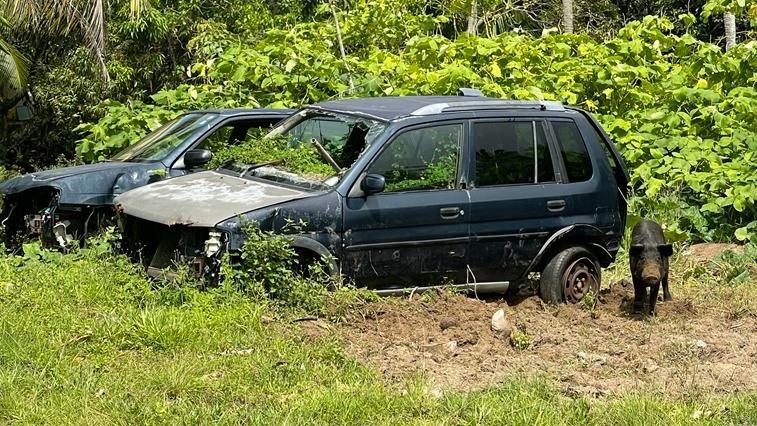OPINION: Barriers to tourism
Saturday 2 July 2022 | Written by Dr. John Dunn | Published in Editorials, Opinion

Having wrecked cars on your land should be illegal, says writer Dr John Dunn. SUPPLIED/22063017
Having wrecked cars on your land should be illegal. They need collecting, crushing and shipping off as scrap. Containers should be moved or perhaps decorated in structured school art projects. I would sponsor that, writes Dr John Dunn.
Turn away from the beaches and look inland. What do you see? Majestic maunga, dogs, lush greenery, more dogs, scented flowers and fruit-laden trees. And some dogs.
Unfortunately, you will also see car wrecks, containers right on the road, invasive species, rubbish holes, smoke from burning plastic and litter on the roadside.
What don’t you see? Footpaths for one. And copious native bird life. There is also a paucity of user friendly tracks up through the bush into that mysterious and beckoning uninvestigated land. Some of the above represents a barrier to tourism. Some is a missed opportunity.
It’s hard to go for a walk on Rarotonga. Apart from dog attack, beyond town and Arorangi there are no paths. It’s dangerous and unpleasant to share space with cars and motorbikes. Besides being great for tourists, proper sidewalks would also encourage movement in the local population who suffer greatly from obesity and diabetes.
The cross-island walk is too daunting for most. What’s needed is doable 30-60 minute walks up to elevated viewing platforms from which to enjoy Te Moana Nui O Kiva.
The whole South Pacific has a major mynah problem. These clever aggressive birds bother humans and suppress native wildlife. It is feasible and probably inexpensive to exterminate them on Rarotonga and Aitutaki. This has been achieved cleverly on a smaller scale on Atiu through a combination of mynah traps and dedicated shooting. With the support of local business, the previously lost and brilliantly coloured Kura lorikeet has been reintroduced by flying mating pairs in from Rimatara. All native bird life has subsequently flourished.
Imagine the same on Rarotonga. Picture our skies filled with large numbers of Kota’a Nui, Kuramo’o, Rupe, Kukupa and Kakaia wheeling and diving. What a wonderful drawcard for tourism especially when compared with the bland scene now filled with raucous pests.
There is probably a lost generation who think it’s ok to throw rubbish from the car. I am hopeful tamariki and mokopuna will be smarter and more aware, and hopefully educate their parents. Rarotonga is much tidier than much of the world, including Fiji, the whole of South America and much of Asia and Africa – but we could do better.
Much of that rubbish is plastic drink bottles. Sugary drinks are a major contributor to obesity in Pasifika peoples. Here’s a wild idea. If the water ringmain ever gets fixed, drink water from the tap. That would save your health, your money and your environment.
In a recent organised clean up day our underworked public servants were instructed to attend. Almost no one turned up. The lame excuse was the memo didn’t get passed on. Perhaps the internet was down, everyone’s computers were off, all water cooler chat disappeared and the coconut wireless stopped functioning for the first time in history. Come on guys. Get off your acres and contribute. There were just a few lonely prisoners and small puna groups doing the work. Where’s the care?
The occasional scattered rubbish bins are a start. However step two is actually emptying them. That memo seemed to get lost too.
Having wrecked cars on your land should be illegal. They need collecting, crushing and shipping off as scrap. Containers should be moved or perhaps decorated in structured school art projects. I would sponsor that.
The failed Sheraton project is a constant embarrassment and monument to stupidity. Allowing the entropy of the jungle and salt air to take over was never a good option. It beggars belief that no one until now could get their act together sufficiently to create something out of it. I don’t pretend to understand the complexities of the history and politics but it’s a relief to see finally some hope arise from that debacle.
Invasive plant species need an all-out assault. Acres of vines are strangling our flora. There is both local and Kiwi knowledge to tackle this if given a mandate and a budget. Again, it’s doable.
Finally, what is needed for a true 5-star experience is a proper golf course. There are flat areas suitable but how you would navigate those land issues I have no idea. Nothing is straightforward in that respect so I wish someone good luck with that one!
Without too much drama and with some effort and funding much of the above could be achieved. There is a lot of goodwill that could be tapped. We could actually become that pristine paradise we aspire to be. At present we are tatty around the edges. And that’s a barrier to tourism.
- Dr John Dunn FRACS is a Cook Islander, visiting surgeon to Rarotonga Hospital and owner of the Motu Beachfront Art Villas.

















































